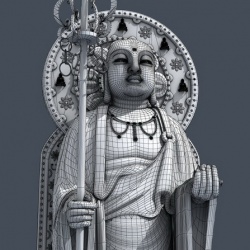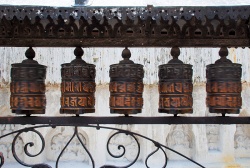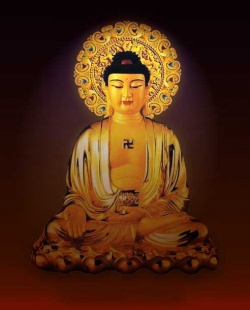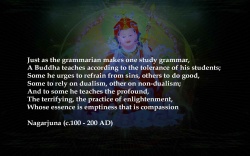Difference between revisions of "Alexander Studholme: The spirituality of Tibet is a lesson to China – and to us"
(Created page with " Defying Dawkins and Mao, religion won't die out. Those in the confused majority should take note In 1955, the Dalai Lama travelled to {{Wiki|Peking}} to...") |
|||
| Line 1: | Line 1: | ||
| + | <nomobile>{{DisplayImages|943|657|3147|4107|3500|4494}}</nomobile> | ||
| Line 6: | Line 7: | ||
| + | Defying [[Dawkins]] and [[Mao]], [[religion]] won't [[die]] out. | ||
| − | + | Those in the confused majority should take note | |
| − | In 1955, the [[Dalai Lama]] travelled to {{Wiki|Peking}} to meet [[Chairman Mao | + | In 1955, the [[Dalai Lama]] travelled to {{Wiki|Peking}} to meet [[Chairman Mao]]. |
| − | [[The Dalai Lama]] took notes as the Great Helmsman advised him on the value of progressive [[education]] and {{Wiki|modern}} [[communication]] systems. But, then, Mao drew him closer. | + | Until their very last encounter, the young [[Tibetan]] leader – then just 19 years old – remained {{Wiki|optimistic}} about a {{Wiki|future}} alliance between his country and [[communist]] [[China]]. |
| + | |||
| + | [[The Dalai Lama]] took notes as the Great Helmsman advised him on the value of progressive [[education]] and {{Wiki|modern}} [[communication]] systems. | ||
| + | |||
| + | But, then, [[Mao]] drew him closer. | ||
"[[Religion]] is [[poison]]," he breathed, "Firstly it reduces the population, because [[monks and nuns]] must stay [[celibate]], and secondly it neglects material progress." | "[[Religion]] is [[poison]]," he breathed, "Firstly it reduces the population, because [[monks and nuns]] must stay [[celibate]], and secondly it neglects material progress." | ||
| + | In his autobiography, Freedom in Exile, the [[Dalai Lama]] recorded his {{Wiki|reaction}}. | ||
| − | |||
| + | "I felt a [[violent]] burning [[sensation]] all over my face and I was suddenly very afraid," he wrote. | ||
| − | + | On further {{Wiki|reflection}}, though, this {{Wiki|fear}} turned into [[confusion]] and even amazement that someone as {{Wiki|intelligent}} as [[Mao]] could have misjudged him so badly. | |
| − | Though apparently able to engage with the [[Dalai Lama]] as {{Wiki|political}} leader of [[Tibet]], it was as if Mao had completely ignored his role as [[spiritual]] leader of his [[people]], finding it impossible to believe that his [[religious]] role could be anything other than a façade or convention. | + | Though apparently able to engage with the [[Dalai Lama]] as {{Wiki|political}} leader of [[Tibet]], it was as if [[Mao]] had completely ignored his role as [[spiritual]] leader of his [[people]], finding it impossible to believe that his [[religious]] role could be anything other than a façade or convention. |
"He surely could not have failed to notice that every day I spent at least four hours in [[prayer]] and [[meditation]]," the [[Dalai Lama]] added. | "He surely could not have failed to notice that every day I spent at least four hours in [[prayer]] and [[meditation]]," the [[Dalai Lama]] added. | ||
| Line 45: | Line 52: | ||
Yet it cannot simultaneously compute the {{Wiki|data}} that [[Tibetans]] wish to continue their [[religious]] way of [[life]]: | Yet it cannot simultaneously compute the {{Wiki|data}} that [[Tibetans]] wish to continue their [[religious]] way of [[life]]: | ||
| − | that they are genuinely [[happy]] to set aside a part of their income as an [[offering]] to the [[Buddha]], that they enjoy dedicating their labour to building [[temples]] and [[monasteries]], and that they still accept [[reincarnated | + | that they are genuinely [[happy]] to set aside a part of their income as an [[offering]] to the [[Buddha]], that they enjoy dedicating their labour to building [[temples]] and [[monasteries]], and that they still accept [[reincarnated lamas]] as figures of authority. |
| − | Everything in their [[communist]] {{Wiki|DNA}} tells the {{Wiki|Chinese}} that the [[experience]] of having better roads and houses should automatically lead to the realisation that such practices are "backward" or "{{Wiki|superstitious}}" and will quickly be left behind. Yet, unaccountably, the [[Tibetans]] continue to maintain these [[traditions]]. | + | Everything in their [[communist]] {{Wiki|DNA}} tells the {{Wiki|Chinese}} that the [[experience]] of having better roads and houses should automatically lead to the realisation that such practices are "backward" or "{{Wiki|superstitious}}" and will quickly be left behind. |
| + | |||
| + | Yet, unaccountably, the [[Tibetans]] continue to maintain these [[traditions]]. | ||
| Line 54: | Line 63: | ||
Left to his [[own]] devices, he leads [[human beings]] away from their [[spiritual]] side, so that they becomes heartless and diminished, one-dimensional machines. | Left to his [[own]] devices, he leads [[human beings]] away from their [[spiritual]] side, so that they becomes heartless and diminished, one-dimensional machines. | ||
| − | "Ahriman," Steiner explained, "is the power that makes man dry, prosaic, philistine – ossifies him and brings him to the {{Wiki|superstition}} of {{Wiki|materialism}}." | + | "Ahriman," [[Steiner]] explained, "is the power that makes man dry, prosaic, philistine – ossifies him and brings him to the {{Wiki|superstition}} of {{Wiki|materialism}}." |
| Line 61: | Line 70: | ||
It would be grotesque to tar the "new [[Wikipedia:Atheism|atheists]]" of our [[own]] {{Wiki|culture}} with the worst excesses of the {{Wiki|Chinese Communist Party}}: | It would be grotesque to tar the "new [[Wikipedia:Atheism|atheists]]" of our [[own]] {{Wiki|culture}} with the worst excesses of the {{Wiki|Chinese Communist Party}}: | ||
| − | Dawkins, Hitchens, Amis et al do not torture teenage [[nuns]] with electric batons as the {{Wiki|Chinese}} do. | + | [[Dawkins]], [[Hitchens]], Amis et al do not torture teenage [[nuns]] with electric batons as the {{Wiki|Chinese}} do. |
Yet, albeit in a much less extreme way, they too have the obvious [[characteristics]] of [[disciples]] of Ahriman: the instinctive loathing of [[religion]] and the grim {{Wiki|certainty}} of their {{Wiki|materialist}} view of [[reality]]. | Yet, albeit in a much less extreme way, they too have the obvious [[characteristics]] of [[disciples]] of Ahriman: the instinctive loathing of [[religion]] and the grim {{Wiki|certainty}} of their {{Wiki|materialist}} view of [[reality]]. | ||
| − | Dawkins is a gifted [[scientist]]; Hitchens and Amis are witty satirists of the folly and wickedness of [[religious]] {{Wiki|extremism}}. | + | [[Dawkins]] is a gifted [[scientist]]; [[Hitchens]] and [[Amis]] are witty satirists of the folly and wickedness of [[religious]] {{Wiki|extremism}}. |
But, unable to [[relax]] the fixation of their point of view, they conclude erroneously that their {{Wiki|theory}} is sufficient to describe and explain all the unfathomable complexity of [[life]], that all aspects of [[religion]] are [[worthy]] only of their easy scorn. | But, unable to [[relax]] the fixation of their point of view, they conclude erroneously that their {{Wiki|theory}} is sufficient to describe and explain all the unfathomable complexity of [[life]], that all aspects of [[religion]] are [[worthy]] only of their easy scorn. | ||
| Line 72: | Line 81: | ||
A [[balance]] is required. | A [[balance]] is required. | ||
| − | For Steiner, it was the "{{Wiki|Christ}} Impulse" that would restore the [[world]] to {{Wiki|equilibrium}}: the [[appearance]] of Gorbachev at Assisi seems eerily demonstrative of precisely that. | + | For [[Steiner]], it was the "{{Wiki|Christ}} Impulse" that would restore the [[world]] to {{Wiki|equilibrium}}: the [[appearance]] of [[Gorbachev]] at Assisi seems eerily demonstrative of precisely that. |
| − | And Gorbachev's [[conversion]] may also be a sign that there might possibly be some in the {{Wiki|Chinese}} [[leadership]] who are prepared to countenance the [[Dalai Lama's]] [[dream]] of autonomous government within [[China]] and a [[Buddhist]] {{Wiki|renaissance}} in [[Tibet]]. | + | And [[Gorbachev's]] [[conversion]] may also be a sign that there might possibly be some in the {{Wiki|Chinese}} [[leadership]] who are prepared to countenance the [[Dalai Lama's]] [[dream]] of autonomous government within [[China]] and a [[Buddhist]] {{Wiki|renaissance}} in [[Tibet]]. |
Since the eighth century, the [[Tibetans]] have been the custodians of the most complete version of the [[Buddhist canon]], [[combining]] the [[psychological]] {{Wiki|pragmatism}} of the teachings of the [[historical Buddha]], the devotionalism, {{Wiki|idealist}} [[philosophy]] and [[compassionate]] [[ethic]] of the [[Mahayana]] school and the [[esoteric practices]] of the [[Vajrayana]], or [[tantric tradition]]. | Since the eighth century, the [[Tibetans]] have been the custodians of the most complete version of the [[Buddhist canon]], [[combining]] the [[psychological]] {{Wiki|pragmatism}} of the teachings of the [[historical Buddha]], the devotionalism, {{Wiki|idealist}} [[philosophy]] and [[compassionate]] [[ethic]] of the [[Mahayana]] school and the [[esoteric practices]] of the [[Vajrayana]], or [[tantric tradition]]. | ||
| Line 80: | Line 89: | ||
We would do well to take seriously the [[Tibetans]]' claim that their {{Wiki|culture}} has the potential to "serve [[humanity]]". | We would do well to take seriously the [[Tibetans]]' claim that their {{Wiki|culture}} has the potential to "serve [[humanity]]". | ||
| + | Our [[own]] [[society]] appears desperately confused about [[religion]]. It is all too easy to be browbeaten by the "new [[Wikipedia:Atheism|atheists]]". But, there is surely nothing wrong with simply admitting that we are confused: such a position is refreshingly honest, open-minded and humorous. | ||
| + | On Easter Day, there is even, perhaps, room for that familiar, much maligned figure: the occasional churchgoer. | ||
| − | + | For there is nothing inherently ridiculous about the [[desire]] to connect with the [[ancient]] [[spiritual]] pulse of this [[island]]. | |
| − | + | It is understandable to be reluctant to leave behind an innate [[sense]] (or {{Wiki|hope}}) that the return of [[life]] brought by spring is a thing of [[joy]] and that it is good to celebrate these vague, inchoate [[feelings]] by exchanging chocolate eggs with our loved ones. | |
[[Dr Alexander Studholme]] lectures on [[Indian religions]] in the [[Divinity]] Faculty, [[Cambridge University]] | [[Dr Alexander Studholme]] lectures on [[Indian religions]] in the [[Divinity]] Faculty, [[Cambridge University]] | ||
{{R}} | {{R}} | ||
http://www.independent.co.uk/voices/commentators/alexander-studholme-the-spirituality-of-tibet-is-a-lesson-to-china-ndash-and-to-us-799522.html | http://www.independent.co.uk/voices/commentators/alexander-studholme-the-spirituality-of-tibet-is-a-lesson-to-china-ndash-and-to-us-799522.html | ||
| − | [[Category:]] | + | [[Category:14th Dalai Lama,Tenzin Gyatso]] |
Revision as of 10:43, 15 January 2016
Defying Dawkins and Mao, religion won't die out.
Those in the confused majority should take note
In 1955, the Dalai Lama travelled to Peking to meet Chairman Mao.
Until their very last encounter, the young Tibetan leader – then just 19 years old – remained optimistic about a future alliance between his country and communist China.
The Dalai Lama took notes as the Great Helmsman advised him on the value of progressive education and modern communication systems.
But, then, Mao drew him closer.
"Religion is poison," he breathed, "Firstly it reduces the population, because monks and nuns must stay celibate, and secondly it neglects material progress."
In his autobiography, Freedom in Exile, the Dalai Lama recorded his reaction.
"I felt a violent burning sensation all over my face and I was suddenly very afraid," he wrote.
On further reflection, though, this fear turned into confusion and even amazement that someone as intelligent as Mao could have misjudged him so badly.
Though apparently able to engage with the Dalai Lama as political leader of Tibet, it was as if Mao had completely ignored his role as spiritual leader of his people, finding it impossible to believe that his religious role could be anything other than a façade or convention.
"He surely could not have failed to notice that every day I spent at least four hours in prayer and meditation," the Dalai Lama added.
This attitude towards religion – combining visceral hostility and blank incomprehension – still informs Chinese communist attitudes towards Tibet, and contributes to the poor relations between the two peoples.
The Tibetans' current grievances can be immediately linked to the experience of being overrun by recent waves of Han Chinese migrants, who are disproportionately the beneficiaries of government subsidies and jobs:
Tibetans are becoming a poor minority in some parts of their own country.
But the Tibetans' anger is also a release of 50 years of terrible oppression, of being denied the freedom to express their cultural beliefs and practices.
And for Tibetans, culture is Buddhist culture.
Relations between China and Tibet involve a clash of two world-views that could hardly be less alike: atheist materialism and Vajrayana Buddhism.
Beijing never tires of pointing out that it has brought great material benefit to Tibet.
Yet it cannot simultaneously compute the data that Tibetans wish to continue their religious way of life:
that they are genuinely happy to set aside a part of their income as an offering to the Buddha, that they enjoy dedicating their labour to building temples and monasteries, and that they still accept reincarnated lamas as figures of authority.
Everything in their communist DNA tells the Chinese that the experience of having better roads and houses should automatically lead to the realisation that such practices are "backward" or "superstitious" and will quickly be left behind.
Yet, unaccountably, the Tibetans continue to maintain these traditions.
In a series of lectures delivered in 1919, the Austrian philosopher and visionary Rudolf Steiner identified one of the dominant powers of the modern age as Ahriman, a Zoroastrian spirit, who is concerned only with an appreciation of the empirical world, the world of the five senses.
Left to his own devices, he leads human beings away from their spiritual side, so that they becomes heartless and diminished, one-dimensional machines.
"Ahriman," Steiner explained, "is the power that makes man dry, prosaic, philistine – ossifies him and brings him to the superstition of materialism."
Nevertheless, Ahriman also has his good side: he is responsible for intellectual advancement and technological progress. No one can deny that the Chinese, in many respects, have been extraordinarily successful in developing their country.
It would be grotesque to tar the "new atheists" of our own culture with the worst excesses of the Chinese Communist Party:
Dawkins, Hitchens, Amis et al do not torture teenage nuns with electric batons as the Chinese do.
Yet, albeit in a much less extreme way, they too have the obvious characteristics of disciples of Ahriman: the instinctive loathing of religion and the grim certainty of their materialist view of reality.
Dawkins is a gifted scientist; Hitchens and Amis are witty satirists of the folly and wickedness of religious extremism.
But, unable to relax the fixation of their point of view, they conclude erroneously that their theory is sufficient to describe and explain all the unfathomable complexity of life, that all aspects of religion are worthy only of their easy scorn.
A balance is required.
For Steiner, it was the "Christ Impulse" that would restore the world to equilibrium: the appearance of Gorbachev at Assisi seems eerily demonstrative of precisely that.
And Gorbachev's conversion may also be a sign that there might possibly be some in the Chinese leadership who are prepared to countenance the Dalai Lama's dream of autonomous government within China and a Buddhist renaissance in Tibet.
Since the eighth century, the Tibetans have been the custodians of the most complete version of the Buddhist canon, combining the psychological pragmatism of the teachings of the historical Buddha, the devotionalism, idealist philosophy and compassionate ethic of the Mahayana school and the esoteric practices of the Vajrayana, or tantric tradition.
We would do well to take seriously the Tibetans' claim that their culture has the potential to "serve humanity".
Our own society appears desperately confused about religion. It is all too easy to be browbeaten by the "new atheists". But, there is surely nothing wrong with simply admitting that we are confused: such a position is refreshingly honest, open-minded and humorous.
On Easter Day, there is even, perhaps, room for that familiar, much maligned figure: the occasional churchgoer.
For there is nothing inherently ridiculous about the desire to connect with the ancient spiritual pulse of this island.
It is understandable to be reluctant to leave behind an innate sense (or hope) that the return of life brought by spring is a thing of joy and that it is good to celebrate these vague, inchoate feelings by exchanging chocolate eggs with our loved ones.
Dr Alexander Studholme lectures on Indian religions in the Divinity Faculty, Cambridge University





